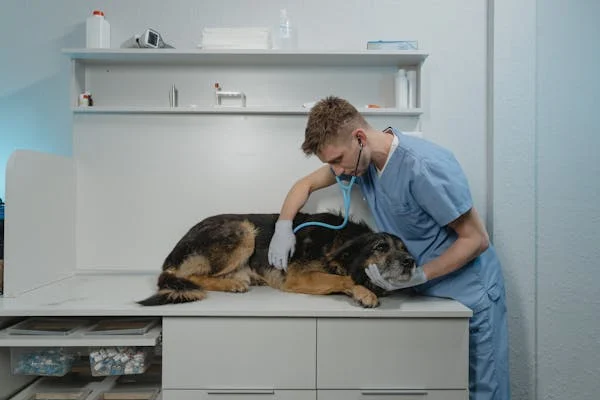Are you on the hunt for a furry friend but worried about allergies getting in the way? You’re not alone! Many people dream of having a dog but need to consider the sneezes and sniffles that might come with it. That’s where the idea of hypoallergenic dogs comes into play. These are breeds thought to be kinder generally friendlyto allergy sufferers than other dogs, and one breed that often pops up in these discussions is the Portuguese Water Dog.
Portuguese Water Dogs, or PWDs for short, have gained a lot of attention for their friendly nature and unique looks. But what makes them stand out in the world of hypoallergenic dogs? Is there really such a thing as a truly hypoallergenic dog, or is it just a myth? And specifically, can Portuguese Water Dogs be the answer for those of us who love dogs but hate allergies?

In this article, we’re diving deep into the world of Portuguese Water Dogs. We’ll explore what makes this breed unique, from their history to their fluffy coats, and tackle the big question: Are Portuguese Water Dogs hypoallergenic? Whether you’re an allergy sufferer or just curious about this fascinating breed, you’re in the right place. Let’s get started on this exciting journey together!
Table of Contents
Portuguese Water Dog Breed Information
Let’s dive into the world of the Portuguese Water Dog, a breed that’s as fascinating as it is fluffy. Originating from the sunny shores of Portugal, these dogs were bred to be fishermen’s best friends. They’re strong, intelligent, and incredibly skilled in water, helping fishermen by herding fish into nets, retrieving lost gear, and even delivering messages between boats and the shore.

Portuguese Water Dogs are medium-sized with a heart full of love and energy to burn. They sport a distinctive black coat that can be either wavy or curly. This isn’t just for show; their coat is a crucial part of their history, helping them withstand the chilly Atlantic waters. Speaking of their coat, it’s often mentioned in discussions about hypoallergenic dogs. But we’ll get into that a bit later.
These dogs are more than just their working background; they’re also known for their spirited and affectionate nature. They form strong bonds with their families and are known to be great companions for children and adults alike. However, their intelligence and energy mean they thrive with engagement and activity, so they’re best suited to families that can keep up with their zest for life.
Portuguese Water Dogs: What a Unique Breed!
What sets Portuguese Water Dogs apart from the rest? It’s not just one thing; it’s a combination of their history, physical traits, and personality that makes them truly unique.
First off, their history as working dogs on Portuguese fishing boats has given them a robust and adventurous spirit. They’re not just pets; they’re partners, always ready for the next adventure, whether it’s a hike in the woods or a swim in the lake. This adventurous spirit is matched by their strong work ethic and intelligence, making them a joy to train and engage in various activities.

Their coat type is another standout feature. Unlike many other breeds, Portuguese Water Dogs have a single-layer coat that does not shed in the traditional sense. This unique coat comes in two varieties: curly, which is similar to poodle fur, and wavy, which is slightly looser. The texture and density of their coat were originally meant to protect them from the cold waters, but nowadays, it’s also a point of interest for those concerned with coat types and allergies.
Personality-wise, Portuguese Water Dogs are as charming as they come. They’re known for being loyal, loving, and incredibly smart. They have a knack for picking up tricks and commands, which, combined with their eagerness to please, makes them excellent companions. However, their intelligence means they need mental stimulation to stay happy. Boredom is not an option for these energetic pooches!
The Myth of the Hypoallergenic Dog
When it comes to finding a furry friend that won’t leave you sneezing and sniffling, you’ve probably heard the term “hypoallergenic dog.” But what does that mean? Let’s bust some myths and uncover the truth.
First off, the idea of a completely hypoallergenic dog is more wishful thinking than reality. Scientists and doctors tell us that all dogs produce allergens, which are the proteins that cause allergic reactions in people. These allergens are found in a dog’s dander (dead skin flakes), saliva, and urine. So, when we talk about hypoallergenic dogs, we’re talking about breeds that are less likely to trigger allergies, not breeds that are allergy-proof.

The myth of the hypoallergenic dog has been around for a while, and it’s easy to see why it’s so appealing. After all, who wouldn’t want a cuddly companion that doesn’t make you itch or sneeze? However, the truth is that the level of allergens varies widely from dog to dog, even within the same breed. This means that while some dogs might be easier on your allergies, there’s no guarantee.
Are Portuguese Water Dogs Hypoallergenic?
Now, let’s zoom in on the Portuguese Water Dog. Given their unique coat and the buzz around them being hypoallergenic, it’s time to see if they live up to the hype.

Portuguese Water Dogs have a single-layer coat that doesn’t shed in the traditional sense, which means less hair around the house. This is often why they’re considered a good option for allergy sufferers. Less hair means fewer places for allergens to hitch a ride, right? Well, it’s a bit more complicated than that. While it’s true that their coat might reduce the amount of hair and dander spread around your home, it’s important to remember that no dog is completely free of allergens.
The good news is that many people with dog allergies have successfully lived with Portuguese Water Dogs. Their grooming needs play a big part in this. Regular grooming, including brushing and bathing, can help reduce the amount of dander the dog produces. Plus, since they’re less likely to leave hair everywhere, it can be easier to keep your environment cleaner and less allergen-filled.
However, it’s crucial to spend time with a Portuguese Water Dog before bringing one into your home if you have allergies. Allergies can vary greatly from person to person, and what works for one might not work for another. Spending time with the breed can help you gauge your reaction and decide if a Portuguese Water Dog is the right companion for you.
Common Health Problems in Portuguese Water Dogs
Portuguese Water Dogs are known for their robust health and energetic disposition, but like all breeds other dogs, they have certain health issues that prospective and current owners should be aware of. Understanding these common health problems can help you provide the best possible care for your furry friend.

Dental Disease
Dental disease is one of the most common health issues in dogs, including Portuguese Water Dogs. By the age of three, many dogs have some form of periodontal disease, which can have serious implications if left untreated. Bacteria from the mouth can spread to other parts of the body, affecting vital organs and leading to serious health issues. Regular brushing at home and professional cleanings by a vet can help prevent dental disease and its complications.
Bone and Joint Problems
Portuguese Water Dogs are active and agile, but they can be prone to certain bone and joint problems, such as hip dysplasia and elbow dysplasia. These conditions can lead to discomfort and reduced mobility, affecting your dog’s quality of life. Maintaining a healthy weight, providing appropriate exercise, and regular veterinary check-ups can help manage and prevent these issues.
Ear Infections
Due to their floppy ears, Portuguese Water Dogs can be susceptible to ear infections. Moisture and wax can accumulate in the ear canal, creating an environment where bacteria and yeast can thrive. Regular ear cleaning and monitoring for signs of infection, such as redness, odor, or excessive scratching, can help prevent ear infections.
Allergies
Allergies are another common health concern for Portuguese Water Dogs. They can be allergic to a variety of substances, including certain foods, pollen, or flea bites. Symptoms may include itching, skin infections, and gastrointestinal problems. Identifying and avoiding allergens, along with appropriate medical treatment, can help manage allergic reactions.
Eye Conditions
Portuguese Water Dogs can also be prone to certain eye conditions, such as cataracts and progressive retinal atrophy (PRA). Regular eye exams by a veterinarian can help detect these conditions early, and in some cases, treatment may be available to manage symptoms or slow the progression of genetic disease.
Cardiac Issues
Some Portuguese Water Dogs may face cardiac issues, including congenital heart defects. Regular veterinary check-ups can help detect heart problems early, and treatment options can vary depending on the specific condition and its severity.
By being aware of these common health problems, you can take proactive steps to ensure your Portuguese Water Dog stays healthy and happy. Regular veterinary care, a balanced diet, appropriate exercise, and preventive measures can all contribute to the well-being of your beloved pet. Remember, early detection and treatment are key to managing health issues and ensuring your water dog leads a long, fulfilling life.
Taking Care of Your Portuguese Water Dog at Home
Having a Portuguese Water Dog (PWD) at home is like having a super energetic and fluffy family member. They’re not just pets; they’re part of the gang! Here’s how you can make sure your PWD puppy feels right at home, stays healthy, and keeps wagging its tail happily.

Make Their Space Cozy
Imagine having a special spot in the house where you can chill, play, and nap. That’s what you should create for your PWD. A comfy bed, fresh water always available, and enough room to stretch and play are key. They love being around the family, so make sure their spot lets them hang out with everyone without getting too crowded.
Food: What’s on the Menu?
Just like us, PWDs need the right food to stay healthy and strong. Pick high-quality dog food that fits their age and how active they are. These dogs can gain weight if they eat too much, so keep an eye on how much you’re feeding them. Chat with your vet about the best food plan and maybe some healthy snacks they can have.
Exercise: Let’s Move!
Portuguese Water Dogs have loads of energy. They need to run, play, and swim to burn off that energy. It’s not just about keeping them physically fit; it’s also about keeping their brains busy. Plus, doing fun activities together is a great way to make your bond even stronger. Remember, a tired dog is a happy dog.
Grooming: Looking Good!
PWDs have a unique coat that needs regular brushing to stay nice and neat. Whether their hair is curly or wavy, keeping it tangle-free is important. They also need baths, nail trims, and ear cleanings to stay clean and healthy. It might sound like a lot, but it’s all part of the fun of having a PWD.
Here are some basic grooming tools you can buy:
Wet Brush Ultimate Grooming Pet Brush, 2-in-1 Dual-Sided Detangling Pet Brush
DOCO Dog Ear Wipes – All Natural Finger Veterinary Pet Ear Wipes with Eucalyptus, Aloe
Learning and Making Friends
PWDs are smart cookies and love learning new things. Starting training early and introducing them to different people and other pets helps them grow up to be friendly and well-behaved. Use treats and praises to teach them; they dig positive vibes. Plus, learning tricks and commands keep their brains ticking.
Health Check-ups
Keeping your PWD healthy means regular visits to the vet for check-ups and shots. Keep an eye out for any signs they might not be feeling well. Taking care of their teeth, watching their weight, and looking out for any specific health stuff for PWDs are all part of being a great pet owner.
Don’t Forget the Cuddles
PWDs are big on affection. They love spending time with their human family members. So, between all the feeding, grooming, and exercising, make sure there’s plenty of time for cuddles and fun. It makes them feel loved and secure.
Routine Care, Diet, and Exercise
Taking care of a Portuguese Water Dog (PWD) is an active and engaging experience that requires a commitment to their overall well-being. Here’s how you can ensure your PWD stays healthy and happy:

Routine Care: Regular check-ups with the vet are essential to catch any health issues early. Don’t forget about dental hygiene; brushing your dog’s teeth can prevent many health problems.
Diet: A balanced diet tailored to their age, size, and activity level will keep your PWD in top shape. High-quality dog food that meets their nutritional needs is crucial for their energy levels and overall health.
Exercise: PWDs are energetic and thrive on activity. They need daily exercise to keep them physically and mentally stimulated. Activities like swimming, running, and fetch are great ways to burn off energy and bond with your dog.
If you’d like tips on how to train your dog, then check out this article.
What to Watch For
Being proactive about your Portuguese Water Dog’s health means knowing what signs of trouble to look out for. Here are some key indicators:

Changes in Appetite or Water Consumption: Significant changes could indicate health issues.
Unusual Behavior: Lethargy, aggression, or sudden fearfulness can be signs of discomfort or illness.
Physical Symptoms: Keep an eye out for coughing, limping, difficulty breathing, or excessive scratching, as these can all signal health problems.
By staying vigilant and knowing what to watch for, you can catch potential health issues before they become serious.
Partners in Health Care
Your veterinarian is your ally in maintaining your Portuguese Water Dog’s health. Building a strong partnership with them ensures your dog gets the best care possible. Here’s how you can work together:

Regular Check-ups: These are crucial for early detection of health issues. Your vet can provide vaccinations, dental care, and routine examinations to keep your dog healthy.
Open Communication: Be honest and open with your vet about any changes in your dog’s behavior or health. The more they know, the better they can help.
Follow Advice: Your vet’s recommendations on diet, exercise, and care are based on their professional knowledge and experience. Following their advice can help prevent health issues and ensure your dog lives a long, happy life.
More Dog Breeds and Further Research
Choosing the right dog breed is a big decision, especially when allergies are a concern. While Portuguese Water Dogs are a great option for some, they’re not the only breed out there that might fit into your lifestyle and allergy needs. Here’s how you can continue your quest for the perfect furry friend:

Explore Other Breeds: There are many breeds touted for their hypoallergenic qualities. Breeds like the Poodle, Bichon Frise, and Schnauzer also have unique coats that may produce fewer allergens. Each breed has its own set of characteristics and care requirements, so it’s worth exploring a variety to find the best match for your home.
Do Your Homework: Research is key when choosing a dog. Look into breed-specific traits, health concerns, and grooming needs. Websites, breed-specific forums, and books are great resources.
Meet Dogs in Person: If possible, spend time with the breed you’re considering. This is especially important for allergy sufferers, as personal interaction can help you gauge your allergic reactions better than any research.
Remember, every dog is an individual, and what works for one person may not work for another. Taking the time to research and meet different breeds can help ensure you find the right dog for your home, lifestyle, and allergy concerns.
Conclusion
Portuguese Water Dogs are a unique and lovable breed known for their energy, intelligence, and distinctive coat. While they are often considered a good option for allergy sufferers, it’s important to remember that no dog is completely hypoallergenic. The idea of a hypoallergenic dog is more nuanced than it might seem at first glance, and the best approach is one of careful consideration and personal testing.
Caring for a Portuguese Water Dog, or any dog, requires a commitment to their health, happiness, and well-being. From routine care and exercise to staying vigilant for signs of health issues, the responsibility is significant but incredibly rewarding. Partnering with a veterinarian and doing your research are key steps in ensuring your dog leads a healthy, happy life.
In the end, whether or not a Portuguese Water Dog is right for you depends on your circumstances, including your allergy sensitivity and lifestyle. By taking the time to research and interact with the most responsible breeders, you can make an informed decision that’s best for both you and your future furry best friend. Remember, the goal is to find a companion who brings joy and companionship into your life, allergies or not.
Not much of a dog person? Then, take a look at our recommendations for the best hypoallergenic cate breeds. If you’re looking for more than just a furry friend, then check out our list of the best hypoallergenic pets for you.

